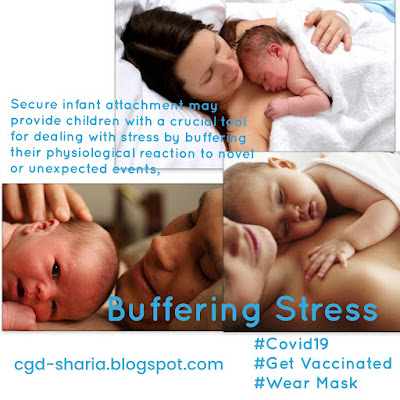Buffering Stress of Infant & Children
All children experience stress as a normal part of growing and learning. Stress can result from positive events as well as negative ones. Welcoming a new baby, for example, is a happy event that still causes stress because it disrupts the normal patterns of the family's life.
Secure infant attachment may provide children with a crucial tool for dealing with stress by buffering their physiological reaction to novel or unexpected events, said Megan Gunnar, PhD, Of the Institute of Child Development at the University of Minnesota.
The secure children seemed to be saying, 'This is scary but I feel safe. 'They had the resources to cope.'
Secure attachments may act as a buffer against the stress of new, strange or scary events. Without that buffer , children find it difficult to cope and their bodies activate a stress reaction.
What is stress
Stress is the body's normal reaction to anything that disrupts normal life. The frightening, challenging, difficult, or even exciting events or situations that cause stress are known as stressors.
The Stress Response
Whenever we experience stress, our brains and bodies go through specific physical and psychological changes. The brain is flooded with a stress hormone called cortisol, which prepares the body to deal with the stressor. Our attention becomes highly focused on the stressful situation, and we typically respond in one of three ways:
🔵by running away,
🔵by fighting back, or
🔵by freezing in place and not responding.
Attachments are relationships that develop from interactions,'said Howes, 'We have to figure out who the caregivers are' and make sure they'er all competent.
While this is a relief to mothers who want have to work, it also emphasizes the need for high-quality child care, Howes pointed out.
Many attachment researchers find themselves playing the part of child advocates, they home or that require high-quality daycare for all children.
🔵 Stressed Baby allowing a child to “cry it out” without parental attention and affection
🔵 not feeding the child when hungry
🔵not offering comfort when the child is disturbed or distressed
🔵limiting body contact during feeding, throughout the day, and during stressful parts of the night
🔵 low levels of human attention, stimulation, “conversation,” and play.
When these occur regularly, they can lead to early chronic releases of high levels of stress hormones, as well as low expression of favorable hormones, as previously discussed.
All these practices have been promoted during the last century in the form of scheduled feedings, “don’t spoil the child,” bottle feedings, which lead to propped bottles, and physical separation during the day and night.
Children who live in unpredictable worlds, who do not have the opportunity to form a secure attachment with a caregiver, or who live in an unsafe physical environment live in a constant state of heightened stress. This severe, chronic stress can have profound and long-lasting negative effects on brain development.
Buffering children from toxic stress and helping reduce that stress to more tolerable levels are important ways adults can support early brain development.
Touch is actually an extremely important sense for a newborn, especially as it is one of their firsts as the other senses are developing.Infant massage is a wonderful way to connect and engage with your little one, and it offers a myriad of benefits.- Rukshana Sharia
















Comments